As you may have read in an earlier post, we are currently seeking book reviewers for our series on Mobilities and Migration. Several compelling new books remain available for review. Interested in reviewing a book that is not on our list? Send us an email!
How to Proceed:
Please write to us at reviews@allegralaboratory.net indicating which of the below books you would like to review, your postal address, and 2-3 sentences explaining why you should be reviewing the book. Please explain how the book relates to your own research or interests. Once we have selected the reviewers, we will get back to you.
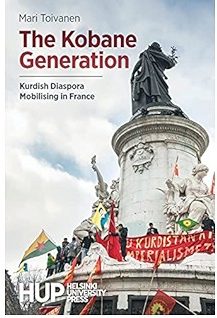 Mari Toivanen (2021) The Kobane Generation. Kurdish Diaspora Mobilising in France, Helsinki UP.
Mari Toivanen (2021) The Kobane Generation. Kurdish Diaspora Mobilising in France, Helsinki UP.
A small Kurdish city located in northern Syria, Kobane, became symbolically significant when ISIS laid siege to the city between September 2014 and January 2015. This pivotal moment in the fight against ISIS threw the international spotlight on the Kurds. The Kobane Generation analyses how Kurdish diaspora communities mobilised in France after the breakout of the Syrian civil war and political unrest in Turkey and Iraq in the 2010s. Tens of thousands of people, mostly but not exclusively diaspora Kurds, demonstrated in major European capitals, expressed their solidarity with Kobane, and engaged in transnational political activism towards Kurdistan.
In this book, Mari Toivanen discusses a series of critical events that led to different forms of transnational participation towards Kurdistan. The focus of this book is particularly on how diaspora mobilisations became visible among the second generation, the descendants of Kurdish migrants. The book addresses important questions, such as why second-generation members felt the need to mobilise and what kind of transnational participation this led to. How did the transnational participation and political activism of the second generation differ from that of their parents, and is such activism simply diasporic or also related to more global changes in political activism?
The Kobane Generation offers important insights on the generational dynamics of political mobilisations and their significance to understanding diaspora contributions. More broadly, it sheds light on second-generation political activism beyond the diaspora context, analysing it in relation to global transformations in political subjectivities.
[separator type=”space”]
Malini Sur. 2021. Jungle Passports: Fences, Mobility, and Citizenship at the Northeast India-Bangladesh Border. Pennsylvania University press.
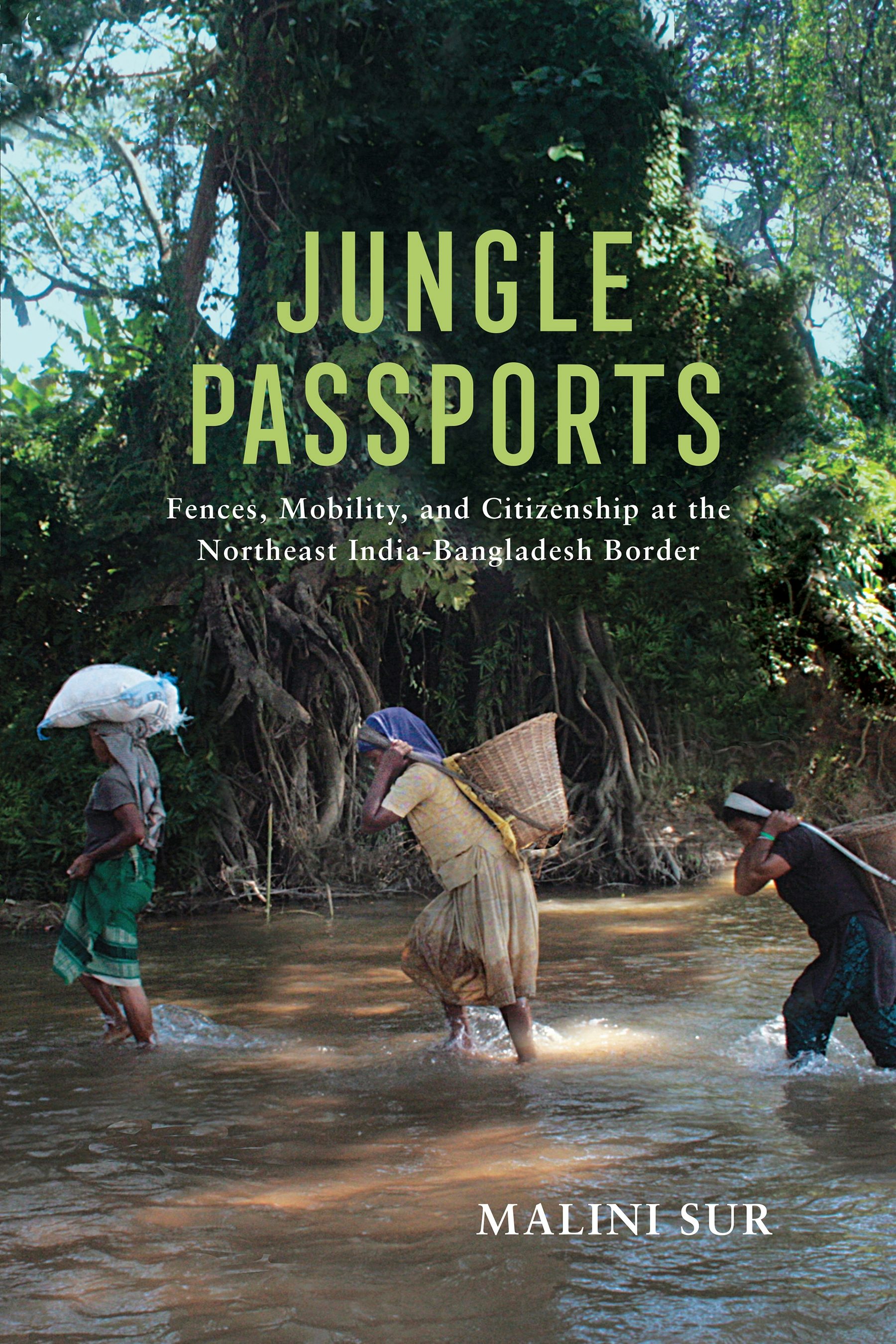
Since the nineteenth century, a succession of states has classified the inhabitants of what are now the borderlands of Northeast India and Bangladesh as Muslim “frontier peasants,” “savage mountaineers,” and Christian “ethnic minorities,” suspecting them to be disloyal subjects, spies, and traitors. In Jungle Passports Malini Sur follows the struggles of these people to secure shifting land, gain access to rice harvests, and smuggle the cattle and garments upon which their livelihoods depend against a background of violence, scarcity, and India’s construction of one of the world’s longest and most highly militarized border fences.
Jungle Passports recasts established notions of citizenship and mobility along violent borders. Sur shows how the division of sovereignties and distinct regimes of mobility and citizenship push undocumented people to undertake perilous journeys across previously unrecognized borders every day. Paying close attention to the forces that shape the life-worlds of deportees, refugees, farmers, smugglers, migrants, bureaucrats, lawyers, clergy, and border troops, she reveals how reciprocity and kinship and the enforcement of state violence, illegality, and border infrastructures shape the margins of life and death. Combining years of ethnographic and archival fieldwork, her thoughtful and evocative book is a poignant testament to the force of life in our era of closed borders, insularity, and “illegal migration.”
[separator type=”space”]
Kefale, Asnake and Fana Gebresenbet, eds. (2021) Youth on the Move: Views from Below on Ethiopian International Migration. Hurst, August 2021.
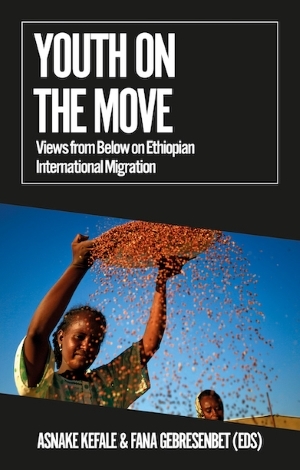 At a time when policies are increasingly against it, international migration has become the subject of great public and academic attention. This book departs from the dominant approach of studying international migration at macro level, and from the perspective of destination countries. The contributors here seek to do more than ‘scratch the surface’ of the migration process, by foregrounding the voices and views of Ethiopian youth–potential migrants and returnees–and of their sending communities.
At a time when policies are increasingly against it, international migration has become the subject of great public and academic attention. This book departs from the dominant approach of studying international migration at macro level, and from the perspective of destination countries. The contributors here seek to do more than ‘scratch the surface’ of the migration process, by foregrounding the voices and views of Ethiopian youth–potential migrants and returnees–and of their sending communities.
The volume focuses on the perspective and agency of these young people, both potential migrants and returnees, to better understand migration decision-making, experiences and outcomes. It brings together rarely documented cases of young men and women from several communities across Ethiopia, migrating to the Gulf and South Africa. Explaining the agency of local actors–prospective migrants, brokers and sending families–Youth on the Move illuminates the pervasive, persistent failure of state attempts to regulate migration. Moreover, it examines the financing of migration and the sharing of remittances, within a culturally situated moral economy. While accounts centred on economics and political violence are important, the contributors demonstrate compellingly that these factors alone cannot provide a full understanding of migration’s complexity, nor of its social realities.
[separator type=”space”]
Judith Schühle (2020) Traversing Transnational Biomedical Landscapes. An Ethnography of the Experiences of Nigerian Trained Physicians Practicing in the US and UK. Transcript
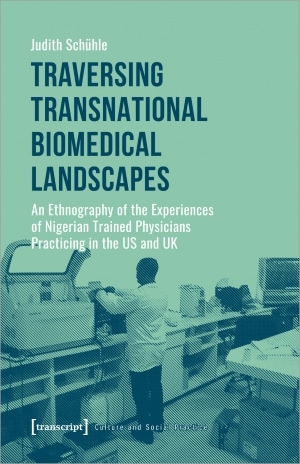 In the age of globalization, the transnational dimension of sciences like medicine seems to be given. However, the agents connecting different parts of this transnational biomedical landscape have yet to receive their due attention. Situated at the intersection of contemporary debates as well as theories of medical anthropology and migration in the 21st century, this book explores the experiences of Nigerian trained physicians who migrated to the US and the UK within the last 40 years. By drawing on individual professional life stories, Judith Schühle illuminates how these physicians disconnect from and (re)connect to diverse local social and biomedical contexts, becoming established abroad while at the same time trying to influence health care services in Nigeria through transnational endeavors.
In the age of globalization, the transnational dimension of sciences like medicine seems to be given. However, the agents connecting different parts of this transnational biomedical landscape have yet to receive their due attention. Situated at the intersection of contemporary debates as well as theories of medical anthropology and migration in the 21st century, this book explores the experiences of Nigerian trained physicians who migrated to the US and the UK within the last 40 years. By drawing on individual professional life stories, Judith Schühle illuminates how these physicians disconnect from and (re)connect to diverse local social and biomedical contexts, becoming established abroad while at the same time trying to influence health care services in Nigeria through transnational endeavors.
[separator type=”space”]
Laura J. Enriquez. 2022. Children of the Revolution: Violence, Inequality, and Hope in Nicaraguan Migration. Stanford University Press.
 Andrea, Silvia, Ana, and Pamela were impoverished youth when the Sandinista revolution took hold in Nicaragua in 1979. Against the backdrop of a war and economic crisis, the revolution gave them hope of a better future — if not for themselves, then for their children. But, when it became clear that their hopes were in vain, they chose to emigrate. Children of the Revolution tells these four women’s stories up to their adulthood in Italy. Laura J. Enríquez’s compassionate account highlights the particularities of each woman’s narrative, and shows how their lives were shaped by social factors such as their class, gender, race, ethnicity, and immigration status. These factors limited the options available to them, even as the women challenged the structures and violence surrounding them. By extending the story to include the children, and now grandchildren, of the four women, Enríquez demonstrates how their work abroad provided opportunities for their families that they themselves never had. Hence, these stories reveal that even when a revolution fails to fundamentally transform a society in a lasting way, seeds of change may yet take hold.
Andrea, Silvia, Ana, and Pamela were impoverished youth when the Sandinista revolution took hold in Nicaragua in 1979. Against the backdrop of a war and economic crisis, the revolution gave them hope of a better future — if not for themselves, then for their children. But, when it became clear that their hopes were in vain, they chose to emigrate. Children of the Revolution tells these four women’s stories up to their adulthood in Italy. Laura J. Enríquez’s compassionate account highlights the particularities of each woman’s narrative, and shows how their lives were shaped by social factors such as their class, gender, race, ethnicity, and immigration status. These factors limited the options available to them, even as the women challenged the structures and violence surrounding them. By extending the story to include the children, and now grandchildren, of the four women, Enríquez demonstrates how their work abroad provided opportunities for their families that they themselves never had. Hence, these stories reveal that even when a revolution fails to fundamentally transform a society in a lasting way, seeds of change may yet take hold.
[separator type=”space”]
Mirjam Twigt. 2022. Mediated Lives: Waiting and Hope Among Iraqi Refugees in Jordan. Berghahn.
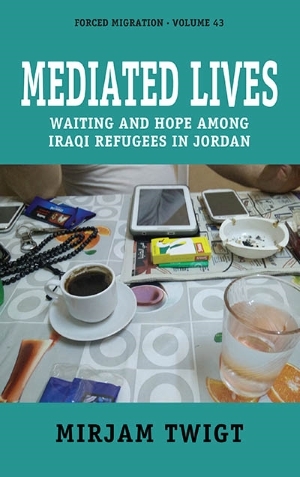 Using the example of Iraqi refugees in Jordan’s capital of Amman, this book describes how information and communication technologies (ICTs) play out in the everyday experiences of urban refugees, geographically located in the Global South, and shows how interactions between online and offline spaces are key for making sense of the humanitarian regime, for carving out a sense of home and for sustaining hope. This book paints a humanizing account of making do amid legal marginalization, prolonged insecurity, and the proliferation of digital technologies.
Using the example of Iraqi refugees in Jordan’s capital of Amman, this book describes how information and communication technologies (ICTs) play out in the everyday experiences of urban refugees, geographically located in the Global South, and shows how interactions between online and offline spaces are key for making sense of the humanitarian regime, for carving out a sense of home and for sustaining hope. This book paints a humanizing account of making do amid legal marginalization, prolonged insecurity, and the proliferation of digital technologies.
[separator type=”space”]
Featured image by Alexander Dodd (courtesy of pexels.com)



